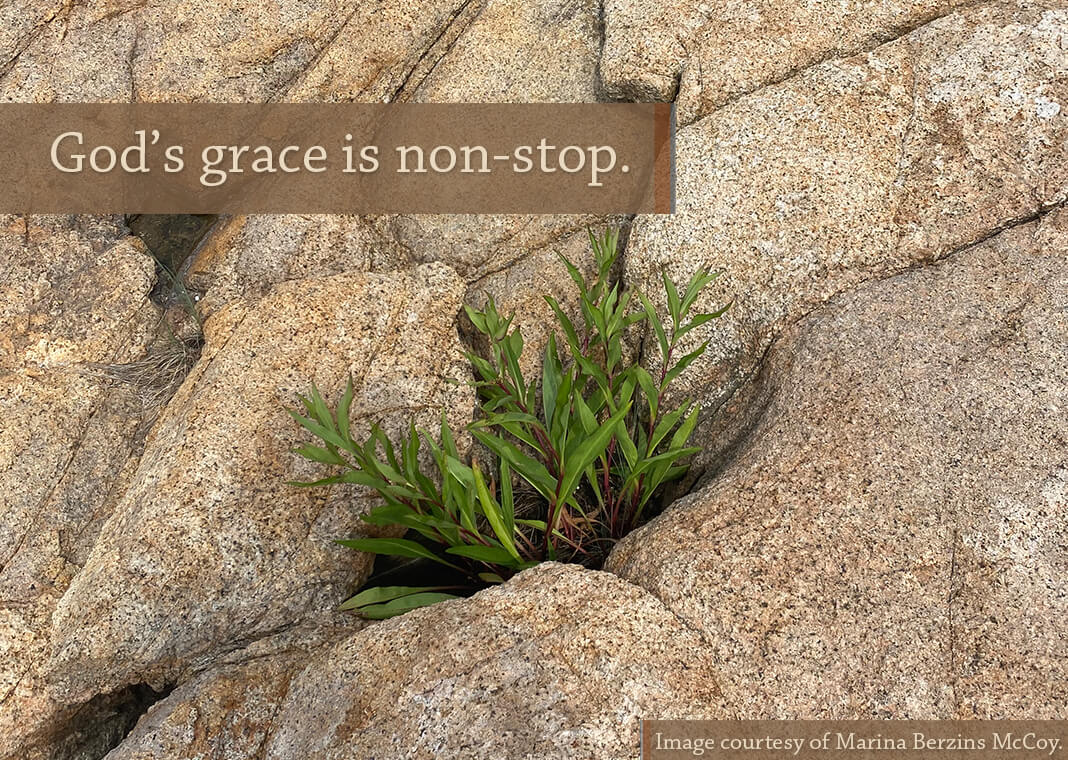
This summer on retreat I spent much time praying while sitting on large rocks off the northeast Atlantic Ocean. The wildlife is abundant there, with a wide variety of sea fowl, rabbits, deer, and many beautiful flowers and trees. I enjoy watching the cormorants and seagulls glide and was lucky enough to have a long, still look at a deer looking back at me. Perhaps less often noticed are the succulent plants that grow in the nooks and crannies of the boulders. Succulents store up water in their leaves so that they can survive without water for a long time; this seaside species gets its water periodically from rainfall, which may be abundant or happen with greater rarity in any given season. Last year, we had a drought in that area. This year, we have had abundant rain. The succulents seem to do well either way.
Succulent plants offer us an image of St. Ignatius’s advice to store up consolation for a time of desolation. Like plants that store water for future use, we can take what consolations we receive in times of experiencing them abundantly, so that when prayer—or life itself—seems drier, we have God’s graces to which to return.
Consolation is more complex than simply having good feelings, but Pope Francis has described it as “an experience of interior joy, consisting in seeing God’s presence in everything.” For example, on retreat I was often filled with awe and gratitude for the gifts of God’s creation. I might feel consolation in moments of gratitude for my adult children as they exhibit an ethic of care for the world. Or consolation might be experienced if I am working hard for a matter of social justice and feel stressed but also have a sense of hope and energy to work for the good.
Life, alas, is not non-stop consolation. But God’s grace is non-stop, even when we do not perceive it. God never stops generously pouring out love and creativity, and encouraging us to be loving and creative too. In other words, sometimes there is a gap between this reality and our perceptions at the moment.
Storing up consolations means that we, like the succulents, can weather the “droughts” a bit better when we return to past felt experiences of God’s grace. For example, I journal during my annual retreat and then return to those consolations throughout the year; they provide much needed “water” at times. Or sometimes I can feel small or powerless in the face of major worldwide challenges, such as the climate crisis. Then, I can make an active effort to recall other times that I have witnessed God’s action work for what is good and beautiful through human community—a community in which I can be an active part. The oceanside succulents can be our teachers and help us to thrive in times of plenty and drought alike.

Marina, thank you. I love the succulent analogy.
Thank you 🙏
Thanks Marina. Nature is a good teacher. The oceanside succulents teach a lot.
Thank you! Blessings!
Loved this reflection, Marina – and the reminder to store up consolation. Thanks!
Thank you! Blessings!